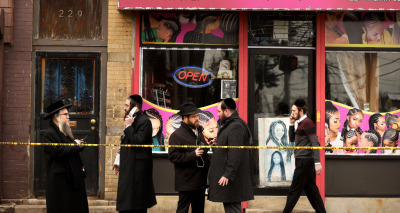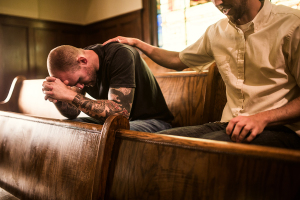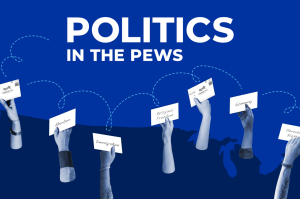George Washington’s antidote to anti-Semitism
The current tenor in American national life is deeply unsettled and increasingly violent. Violent language online stokes plans for some individuals to commit acts of violence, and too often those acts of violence carry an anti-Semitic edge.

A string of attacks in late 2019 left the Jewish Community in the New York area particularly unsettled. In April 2019, a gunman opened fire at the Chabad of Poway, California. That violence followed on the heels of the October 2018 attack on the Tree of Life Synagogue in Pittsburgh, Pennsylvania. The Pittsburgh shooting not only killed eleven but served as an inspiration for the gunman in Dayton, Ohio, in August 2019. Meanwhile, charges of anti-Semitism are hurled across partisan lines to tar opponents, even as some political statements do indeed carry anti-Semitic tones.
Faced with these problems, the United States needs to be building its opposition to both creeping anti-Semitism and the sidelining of religious minorities. To the nation’s credit, its first President, George Washington, has already laid down a clear marker and an antidote to anti-Semitism.
Washington made a powerful statement of welcome for all religious minorities, but he directed it to America’s early Jewish residents. His 1790 “Letter to the Hebrew Congregation of Newport, Rhode Island” is protected as a national treasure by the Touro Synagogue, the letter’s recipient. In the letter, Washington did two important things. First, he defined the value of full religious liberty for all groups. Second, he extended a hand of welcome by building a bridge between communities with biblical language.
Washington wrote the letter in response to an address from the synagogue’s warden, Moses Seixas, and in fact echoed several important phrases by way of endorsement. Most notably, the line Washington used to describe American governmental policy “which gives to bigotry no sanction, to persecution no assistance” came originally from Seixas’s address. Washington elaborated that the only expectation for welcome was that those who would “live under its protection should demean themselves as good citizens, in giving it on all occasions their effectual support.”
Washington emphasized the value of religious liberty, even as he drew an important distinction between liberty and toleration. “All possess alike liberty of conscience and immunities of citizenship,” he insisted. That liberty of conscience would be protected by the First Amendment, which was then on its way to ratification. Further, Washington observed, “It is now no more that toleration is spoken of, as if it was by the indulgence of one class of people, that another enjoyed the exercise of their inherent natural rights.” In some colonial societies, religious minorities had been tolerated —undisturbed but clearly identified as second-class in their civil status. Washington rejected that. Instead, the nation would stand for full religious liberty — for all religious groups — a liberty rooted in natural rights that the Declaration of Independence had declared came from a Creator. Washington foresaw the creation of a truly American way of religious liberty.
Further, he built bridges to the Hebrew congregation by drawing on biblical language. Now, Washington’s biblical references are sometimes elusive — as the scholar Daniel Dreisbach has observed — he rarely highlighted them, provided references to passages, or set them off with quotation marks. Still, a close reading of the Letter demonstrates at least three biblical allusions.
First, Washington addressed the recipients of the letter as the “Children of the Stock of Abraham” — a phrase that echoed Seixas and which was derived from Acts 13:26. Second, Washington wished them good relations with all other American citizens, “while every one shall sit in safety under his own vine and figtree, and there shall be none to make him afraid.” This, one of Washington’s favorite biblical passages, captured the peacefulness of individual labor and rest in a free and well-ordered state. Washington drew on this vision of liberty repeatedly, as he quoted the words from the Hebrew prophet Micah. Finally, Washington closed with a grace note, as he offered the prayer, “May the father of all mercies scatter light and not darkness in our paths, and make us all in our several vocations useful here, and in his own due time and way everlastingly happy.” Here, his invocation of God drew upon the Apostle Paul, who declared “Blessed be God…the Father of mercies” in II Corinthians 1:3. Thus, although Washington and the synagogue divided over sacred texts, they were bound together by reverence for divine revelation and the power of those words for religion and life.
In these ways, Washington articulated a bedrock principle for the new nation. Religious liberty would be protected for all. In his day and ours, this has to extend to those we disagree with, find baffling or distasteful. By learning from the exchange of Seixas and Washington, the country can continue to build a religiously pluralist society built upon principle which will continue to give “to bigotry no sanction.”
Dr. Jonathan Den Hartog is professor of History at Samford University, the author of Patriotism and Piety: Federalist Politics and Religious Struggle in the New American Nation, and a Scholar Advisor for the Faith and Liberty Discovery Center in Philadelphia, Pennsylvania.



























